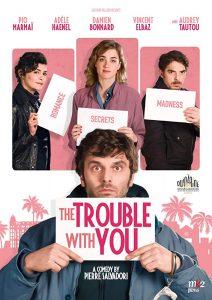“The Trouble with You” (“En liberté!”) (2018). Cast: Adèle Haenel, Pio Marmaï, Audrey Tautou, Vincent Elbaz, Damien Bonnard, Hocine Choutri, Octave Bossuet. Director: Pierre Salvadori. Screenplay: Benjamin Charbit, Benoît Graffin and Pierre Salvadori. Web site. Trailer.
How far are we willing to go to make amends? To be sure, many of us justifiably feel compelled to right our wrongs, often with good reason. But, when it comes to compensating for the misdeeds of others for whom we feel responsible, how long must we leave ourselves on the hook, if at all? That’s a conundrum faced by a noble public servant with good intentions – and not always the best results – in the wacky new French farce, “The Trouble with You” (“En liberté!”).
To the residents of a French Riviera resort town, Police Captain Jean Santi (Vincent Elbaz) is a local hero. Having successfully taken on local crime figures, such as drug kingpin Mariton (Hocine Choutri), Santi is hailed for his daring heroics, an accomplishment that even earns him a statue on the town’s waterfront. It’s seen as a fitting tribute to a detective who lost his life in the line of duty, leaving behind his police lieutenant wife, Yvonne (Adèle Haenel), and his idolizing young son, Théo (Octave Bossuet). There’s just one problem with all the accolades: they’re undeserved.
Two years after Santi’s death, Yvonne learns that her husband was a crooked cop. While conducting a raid on a shady S&M parlor, Yvonne discovers that Jean took a hefty cut from an insurance claim related to a scam involving a jewelry store robbery, one that also netted a sizable rock for his wife’s hand. What’s worse, though, she also finds out that Jean covered his tracks by framing an innocent man, Antoine Parent (Pio Marmaï), who has spent the past eight years in prison.
Outraged, Yvonne plans to blow the whistle on her late husband to a local judge. But family friend and fellow cop Louis (Damien Bonnard) dissuades her from doing so, suggesting that such a revelation would tarnish Théo’s memory of his father. Besides, with Antoine’s release from jail only two weeks away, Louis contends that any intervention on Yvonne’s part at this point wouldn’t substantially reduce his sentence.
In light of the foregoing, Yvonne decides to shelve her plan. However, she nevertheless feels compelled to make amends for her husband’s actions. Given the injustice perpetrated against Antoine, she wants to help smooth his transition from prison to everyday life. She’s especially concerned about his well-being when she learns that incarceration has been difficult for him. In response to being erroneously locked up, Antoine has developed anger management issues and violent tendencies, traits that threaten to flare up inexplicably on a moment’s notice. And now that he’s about to be let back into society, Yvonne is worried that he might harm himself or others, perhaps causing significant harm and winding up back behind bars in no time, all through no fault of his own.
Upon Antoine’s release, he’s agitated at what happened to him and quietly hatches plans to seek revenge against a society that he believes treated him unfairly. But, given that he’s easily confused by everything that has happened, he doesn’t always think things through, exhibiting behavior that often comes across as erratic. His devoted wife, Agnès (Audrey Tautou), who has waited faithfully for his return, does her best to cope with him, but it’s more than she can handle. Something needs to be done to keep Antoine out of harm’s way.
Enter Yvonne. As she learns of Antoine’s cockeyed schemes, she clandestinely seeks to intervene, trying to rectify matters anonymously before he gets in trouble. However, when he soon discovers her, he immediately becomes smitten, and suddenly she has a second set of issues to contend with. Yvonne clearly wants to do the right thing, but how far will she need to go to keep everything stable?
To complicate matters, Yvonne also must wrestle with a number of other issues, such as the ongoing fallout from the raid that she and her peers conducted at the S&M parlor. Then there’s the growing affection being shown her by co-worker Louis, who begins making his moves at the same time as Antoine’s advances. And, through it all, she also has her responsibilities as a single parent, doing what she can to raise her son and shield him from the truth about (and her growing anger at) his late father. It’s a full plate, to say the least.
[caption id="attachment_10673" align="aligncenter" width="300"] Police lieutenant Yvonne Santi (Adèle Haenel, right) seeks to help wrongly incarcerated ex-con Antoine Parent (Pio Marmaï, left) after his release from jail in the delightful French farce, “The Trouble with You” (“En liberté!”).[/caption]
Police lieutenant Yvonne Santi (Adèle Haenel, right) seeks to help wrongly incarcerated ex-con Antoine Parent (Pio Marmaï, left) after his release from jail in the delightful French farce, “The Trouble with You” (“En liberté!”).[/caption]
Most of us would agree that there’s much to be said for making amends. Atoning for any wrongs we may have committed against others enables us to feel better about ourselves, and it’s a result that comes about by our belief in that possibility. That should come as no surprise, though, given that our thoughts, beliefs and intents are the drivers of the conscious creation process, the philosophy that maintains we manifest what we experience by drawing upon the power of those metaphysical building blocks.
For Yvonne, this concern is obviously a crucial one. She’s appalled at what her late husband did and feels compelled to make up for it, especially where Antoine is concerned. That goal is certainly laudable, too, but one also can’t help but wonder why she’s so obsessed with this idea given that the transgressions were Jean’s creation, not hers. What gives?
In the end, it comes down to the beliefs Yvonne holds as she embarks on this process. In one regard, this could be a family honor issue; by making up for her late husband’s misdeeds, she may well believe she has an opportunity to restore the respectability that Jean tarnished. There could also be a professional pride issue involved; as a fellow police officer, her actions now may help to wipe away the crimes of a crooked cop. She obviously doesn’t have to do any of this, and her efforts are most definitely noteworthy.
However, if her intents are so noble, then why do her efforts frequently go awry? That’s where Antoine comes into play. As this is an act of co-creation, he obviously has a say in matters, too. He believes he has an axe to grind, and he feels justified in seeing through on his plans, even if he doesn’t always think them through. What’s more, there’s the question of how he got into this mess in the first place – his experience in allowing himself to be made a scapegoat, even if unwittingly so. For whatever reason, there may well have been a life lesson in this experience that he needed to get, and these circumstances allowed him to get it, for better or worse. It may not have been our preference, but it arose out of his reasons and the beliefs that backed them. And now that Yvonne is attempting to become involved in setting things right, she could be thwarting his efforts to get the experience he believes he needs to get, no matter how genuine her intents may have been going in.
All of this raises questions related to the power of choice, one of the key tools available to us as conscious creators. For Yvonne, she can either become involved in helping Antoine or keeping her distance. And, for Antoine, he can either carry through on his objectives or let go of the past and seek to chart a new course. In both cases, whatever the characters decide to do comes down to whatever beliefs they hold, as they will determine the choices they make and, ultimately, the results they obtain. Considering the confusion that plays out, however, this is an area to which both Yvonne and Antoine might want to pay closer attention. Without that, each of them might end up unfortunately saying to the other, “The trouble with you is trouble for me!”
Although sometimes a little too complicated for its own good, this hilarious screwball comedy delivers big laughs from beginning to end, full of side-splitting twists and turns that will leave your belly sore by the time of the closing credits. Director Pierre Salvadori serves up an array of giggles, chuckles and guffaws with material that’s fresh, original and inventive. That’s particularly true of the cleverly crafted bedtime stories Yvonne tells Théo about his father, tales of Jean’s exploits depicted through flashback sequences that fuse elements of American TV cop shows, 1970s Blaxploitation movies and classic Jean-Paul Belmondo crime capers. Don’t be surprised if you walk away from this one exhausted but sufficiently entertained.
As the winner of the 2018 Cannes Film Festival Directors’ Fortnight Award, “The Trouble with You” has been an enormous hit in its native France, as well as an immensely popular crowd-pleaser in other parts of Europe, Asia and Australia, released under the name “En liberté!” (“Unleashed!”). Unfortunately, in North America, the picture has primarily been playing at film festivals, which may make finding it a little difficult. Check the film’s web site for details.
While many of us may feel the urge to help others who’ve been wronged, there are times when we may be better off leaving those proverbial sleeping dogs to their own devices. Whatever we do, we should first assess the situation carefully and follow our gut to determine how we should proceed. After all, while there may be something to be said for being of assistance, there’s also something to be said for knowing when not to go looking for trouble.
Copyright © 2018-19, by Brent Marchant. All rights reserved.
Tuesday, April 23, 2019
‘The Trouble with You’ asks, ‘how far must we go to make amends?’
Subscribe to:
Post Comments (Atom)

No comments:
Post a Comment